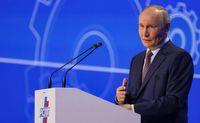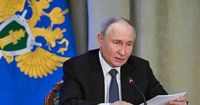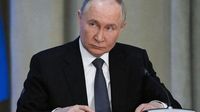Russian President Vladimir Putin has taken a bold step in his attempts to assimilate Ukrainian citizens, as his government reportedly pressures Ukrainians in occupied territories to adopt Russian citizenship. A recent decree, signed by Putin, has intensified these efforts and has made it clear that those who refuse such citizenship face forced eviction.
According to the British Ministry of Defence, executive orders from the Kremlin mandate that Ukrainian citizens residing in contested areas must “settle their legal status” by September 10, 2025, or vacate these regions. This decree appears alarming, with the British defence authorities suggesting it is a tactic designed to push out those Ukrainians who reject Russian identity and assimilation.
“Putin's decree is almost certainly intended to force the departure from Russian-occupied Ukrainian territory of Ukrainian citizens who refuse to accept Russian passports and citizenship,” the ministry articulated in its intelligence brief, which was released on March 22, 2025. It underscores a clear intent by the Kremlin to enforce a policy of Russification in these areas—territories that many view as illegally occupied.
The territories mentioned in the decree include Crimea, which has been under Russian control for over a decade following its controversial annexation, alongside regions like Luhansk, Donetsk, Zaporizhia, and Kherson, all annexed in 2022. The overarching aim of these moves appears to be the systematic eradication of Ukrainian culture, identity, and statehood from these regions, according to British sources.
This exertion of power over Ukrainian citizens aligns with a broader narrative advanced by the Russian government, which has historically dismissed Ukraine's sovereignty, treating these areas as integral parts of Russia despite international condemnation. New measures such as this decree build upon decades of tension between these neighboring countries, marked by Russia's push to suppress Ukrainian heritage and elevate a Russian identity.
In further elaborating on the implications of this decree, the British intelligence report highlights the Kremlin's long-standing efforts to extinguish Ukrainian culture and identities, labeling these actions as not merely legislative but as part of a strategy to dominate historically Ukrainian land in a cultural and political sense. It is designed to instill a permanent Russian presence and diminish any vestiges of Ukrainian autonomy.
While announcements regarding such measures are often met with outcry from the international community, Putin’s regime has displayed a pattern of disregarding external criticism. Reports suggest that Ukraine will likely respond to the decree, marking it as another infringement on its sovereignty.
The fact remains that the legal landscape for any Ukrainian citizen residing in these regions is becoming increasingly complex and precarious. By demanding that residents either accept Russian citizenship or vacate their homes within the next two years, the Kremlin is undoubtedly inflating the pressure on those who wish to maintain their Ukrainian identity.
As the September 2025 deadline looms, it will become ever more pertinent to observe how these developments will influence the living conditions and demographic make-up of these regions. The potential for increased military tension remains a distinct possibility, as Ukraine contemplates measures to protect its nationals.
In its long-term projection, the ongoing situation reflects a broader clash between Russian determinism and Ukrainian nationalism. It is critical for stakeholders, both regional and global, to keep a pulse on these developments.
The message from this decree is crystal clear—it is not just about citizenship; it is about asserting control over a population and rewriting the history of Ukraine under a banner of Russian dominance. Many fear that continued enforcement of this directive will lead to a further fracturing of relationships in Eastern Europe, irreparably altering the proportions and narratives that have defined the region.
In conclusion, the current efforts to force citizenship integration underscore a critical juncture in the Ukrainian-Russian conflict. The decree not only affects the individuals caught in its crossfire but also sends shockwaves across diplomatic channels, amplifying the call for immediate global attention and action.



